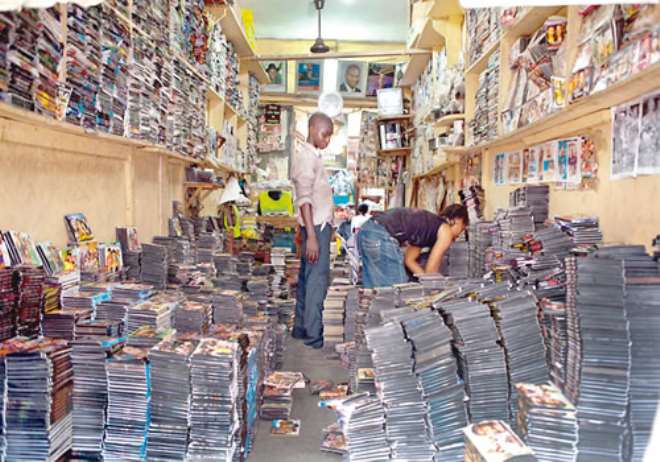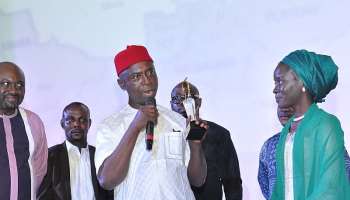Alaba Mafia: The real ‘stars’ of Nigerian music industry
The Nigerian music industry is largely regarded by many as successful, though there is still room for improvement. But the success recorded in the industry today cannot be said to have come solely through the hard work of the musicians without recognising the ingenuity of the Alaba music promoters, also known as the Alaba Mafia, SEGUN ADEBAYO reports.
Gone are the days when entertainers lived from hand to mouth, with virtually no hope of a bright future. Today, across the continent, and indeed, in most parts of the world, music created by young Nigerians has become dominant. To put it simply, Nigerian musicians have taken the world by storm. They are on top of their game. But unknown to many Nigerians, the business of music is controlled directly inside the Alaba market. Not only that the fortune and misfortune of the average artiste irrespective of his talent is shaped by some individuals who may not necessarily know anything about music. These individuals are the marketers. They are heart of the Alaba mafia!.
Some weeks ago, Sunday Tribune, in company with a popular hip hop singer who begged for anonymity, visited Alaba market to parley with some of the marketers. The visit, according to the artiste, was to meet with those he called the 'Alaba boys'. Attempts to make him reveal the identity of these Alaba boys proved abortive as he insisted on not disclosing their names.
But Sunday Tribune's investigation revealed that these Alaba boys, to some artistes and even law enforcement authorities, are pirates, but to many other artistes, they are godsent benefactors, their source of livelihood.

Though, the issue of piracy still dominates the creative landscape, it is said that at Alaba market, the pirates are royalty and musicians whose intelectual properties are violated even acknowledge their enormous influence and go to any length to patronise them. Rather than protect their work from pirates, Sunday Tribune reliably gathered that many Nigerian musicians now take their songs to the 'Alaba boys' to be 'pirated' so as to make the songs popular and well distributed across the country and even beyond.
Sunday Tribune went round the market and discovered that piracy, indeed, is a big industry on its own but you dare not call it piracy in the presence of the boys, unless you are ready to start a heated argument that may never end. To them, they are a source of blessing to many of the musicians, because they help these musicians to popularise their songs. Their distribution network is enormous and it is one of the reasons they have succeeded in the business, and why the artistes, on their own volition, take their 'work' to them. It is common practice for artistes to sign marketing deals and relinquish distribution and duplication rights to marketers, especially the Alaba-based ones. If a song is released in Alaba today, it will circulate all over the country in less than 24 hours. Once the song is popular and widely acceptable, it can be sure to bring the singer some instant success.
Some years back, Nigeria's mega pop twins, P-Square, were said to have collected a whopping N50 million for the marketing, duplication and distribution of their new album by a popular Alaba-based marketer. Their “Game Over” album was reportedly sold to Tjoe Enterprise, a major Alaba marketer, for nationwide distribution for a reported sum of N10 million. It is without doubt that the value of the singers has since appreciated between then and now, having headlined gigs and major concerts within and outside the country, increasing their fan base all across Africa and gradually becoming Africa's Michael Jackson since their performances now cause girls to faint in admiration of their skill and looks. Hear them: “What we do is that we strike a deal in Nigeria, go to Ghana and strike a deal, then to Gabon, Liberia, Tanzania and Uganda. In Nigeria, we have Tjoe. What we did for the album in Nigeria was that we calculated how much 10 million copies was worth and the marketer paid us straight away.”.
Another artiste who was said to have sold his album rights to the Alaba boys is Burna Boy. His widely sold L.I.F.E album was allegedly bought by a marketer called Uba Pacific. He was said is to have bought the rights for the album for a fee of N10 million.
Five Star music act, Harrysong, who is due to release his maiden album in the next two months, was said to have held series of meetings with the Alaba boys, apparently trying to tie down a deal with a prominent marketer for the distribution and promotion of his album. When asked what he had been discussing with the marketers, Harrysong said: “I like the fact that they are united and coordinated. I don't know how they do their thing, but it works for most of us. I visited them, because I am dropping my album soon and I wanted to see how we could work together for the success of the album.” On why he thought the marketer could deliver, the Better Pikin crooner said “I have never doubted their effective networking and I am not the first person to be doing business with them, so I have a total confidence in them,” he said.

How Alaba deal is usually struck
Sunday Tribune attempted to speak with some of the Alaba boys but after several pleas, only a few of them were willing to talk. The reasons for their reluctance to talk are not far to seek: they work together as a team and would not reveal any information unless they get an approval from their president. But Sunday Tribune was able to secure the assurance of some of the marketers, who evetually revealed how they conduct their business deal with the artistes.
According to one of the marketers, who preferred anonymity, the intervention of Alaba was instrumental in the success currently enjoyed by hip hop artistes. The ingenuity of the Alaba mafia, he disclosed, gave birth to the introduction of mix-tape. This is the collection of different songs produced by various artistes, which will be arranged and reproduced on a CD before being sold out cheaply.
The boys were said to have started with foreign music, because as of that time, Nigerian hip hop songs were not globally accepted. Except for songs from Ruggedman, 2face, Edris Abdulkareem and Tony Tetuila, which dominated the music industry, not much attention was paid to the Nigerian music industry then. The global attention that the music industry now enjoys can said to have been made possible by the ingenuity of the Alaba boys. Some observers of happenings in the music industry have argued that even though today's hip hop singers continue to maximise their talents and express themselves through music, not much would have been heard about them without the impact of the Alaba boys who, apart from making their songs to be heard, also contribute largely to their distribution. These Alaba boys also generously enrich the artistes by sharing the 'spoils' of their trade with them
Contrary to the impression the Nigerian audience of hip hop music has about the artistes, it is not always true that popularity of a particular artiste is matched with financial success. Though Hip hop music has found its way into the Nigerian market, the fact remains that a large number of those who sing this genre of music in Nigeria are still far from getting it right compared to how it is being handled by their foreign counterparts. This is evident in the way Nigerian superstars make frantic efforts to feature established American-based hip hop stars in their songs. There had been series of collaborations between Nigerian musicians and foreign acts, but none of it yielded the much desired result. The international labels are simply not attracted. No concrete deals are being signed with Nigerian acts. D'Banj was said to have been signed to Kanye West's G.O.O.D Music label some years back, but that contract has yielded almost nothing.
“I am not denying the fact that the music industry has really improved compared to what it used to be. I quite understand and indeed appreciate the efforts the hip hop singers are making to take their music to the developed countries and make it seem they understand the game. But trust me, they can't do it professionally the way their foreign counterparts would have done it. I think they need to turn their attention to their own genre of music and stop trying to model their career after another genre of music which they are not used to,” said a prominent veteran musician who craved anonymity.
Marketers in Alaba have stopped paying artistes to secure marketing rights of their albums in the last few years. They now prefer to split the royalties made from the sales of albums.
'If Alaba is not involved in your song, it is not going anywhere'
Speaking with Sunday Tribune, one of the popular Alaba music promoters, Kelvin Richman, said that some music promoters have stopped buying artistes' rights of album but that does not mean some still don't buy. Kelvin, who said he had been a music promoter for more than seven years, observed that but for the introduction of the Alaba mix-tape, many artistes would have gone into oblivion. He said he collects at least a minimum of 12 songs per day.
“Don't let them deceive you, we are the reason why most them are still relevant. I can tell you that most of the celebrated superstars in Nigeria today were discovered in Alaba. If I begin to tell you names, you will be shocked,” he said.
While the conversation with Richman was still on, an upcoming artiste walked into his shop to cut a deal with him. The deal was to allow Richman take a certain percentage from a yet-to-be released album. Richman will market, promote and distribute the album across Nigeria.
“This is what we do for them and when they are now superstars, they will forget how they started”, he said.
'When Alaba takes charge of your songs…'
From Richman's shop to Tbthings Entertainment, the story is not different. TBthings is a major music promoter in Alaba and has no fewer than eight people working directly with him. Though he was not willing to talk at first, but after much pleading, he said: “I don't know what you intend to do with this information you have come to get, but, please, don't go out there to say what I never told you. We promote songs that artistes bring to us. If you don't come to us, we can't beg you. But you can be rest assured that your songs will not be heard in the streets. Any artiste that you hear his songs in the street, trust me, he must have come here. We have made many artistes and only few of them appreciate what we do. Mention one superstar in Nigeria today that has not come here for promo. The established artistes hardly come here when they have a new song; they prefer to send their managers to us to make a deal. This deal is not something I would like to reveal to you, but it is always a fruitful one for the both parties.”
'Only God knows if an artiste will blow'
For 9jamaica International marketer, It is only God that can decide if an artiste will 'blow'. He strongly believes that no matter how hard a marketer may to push a song, if God's hand is not on the album, it is going nowhere. He, however, denied that Alaba music promoters have stopped paying artiste their royalties.
“If the artiste is promising, marketers will put their money on him,” he noted. According to him, artistes are discovered in Alaba every day.
“If I should start telling you how many artistes we have discovered in Alaba in the last one month, you will marvel. We make money but not as big as people wrongly assume. The established artistes don't pay much. They come here with maybe N20, 000 for their promo, while the upcoming ones can go for N150,000 to promote a song. The truth is that the trend is now changing and we are getting used to it”.
'We are not pirates, we create wealth…'
Rudeboy Entertainment is arguably one of the biggest music promoters in Alaba. Every artiste wants him to promote their songs and hardly will a week pass without Rudeboy churning out new mix tapes. “If you want to circulate your songs, give them to Rudeboy. You can even go to bed and be expecting your money”, said Oritsefemi during a phone conversation.
Speaking with Sunday Tribune, Rudeboy said marketers are not pirates but promoters.
“We have been creating wealth here. Nobody can tell us we are infringing on their intellectual property, because they come here themselves. We don't force them. We are business partners and we all smile to the bank when we make good sales.”
Corroborating Rudeboy's submission, Vector The Viper, said: “That is the sorry state we have found ourselves, because those saddled with the responsibility of making sure things works properly in this country have gone to sleep. I can't imagine begging a marketer to promote my songs. It is that bad. The fact is that if you don't do it, your colleagues will and you would be left to bite your fingers for not toeing their path. I don't see this stopping until we have a proper distribution network in this country.”
According Ruggedman, the Alaba boys are there but not as loud as they used to be, because they are not buying artistes' album rights like they used to do. “Now, they are more into mix-tapes on the subject of them regaining their eroding influence, I do not see that happening. I say this because the new Performing Musician Association of Nigeria (PMAN) president is already introducing barcoding of songs and Cds. We know Alaba for pirated CDs. So, this will further diminish their influence unless they choose to 'finally' do the right thing, which is to become the market for highest selling original CDs”, he boasted.
Sunday Tribune gathered that the Alaba Market is the biggest headache for the National Copyright Commission (NCC) and other investors in the intellectual property in Nigeria. Although many of them insisted they do legitimate business by dealing directly with the artistes involved and promptly paying them their entitlements, it is alleged that Alaba also habour some of the Alaba marketers, who go out to pirate the works of artistes. This latter category, some of the Alaba marketers, who spoke with Sunday Tribune, agreed, are those giving the business its bad name. It is this category of dealers that has continued to illegally reproduce the works of Nigerian and foreign artistes, they have also consistently resisted attempts by men of the NCC to bring sanity into the creative industry.
But, however, for the Alaba mafia and the artistes who daily thronged the place to have their works 'pirated', it is business as usual. And the beats go on.
Latest News
-
 "If You're For Me, I Am For You" - Cubana Chief P
"If You're For Me, I Am For You" - Cubana Chief P -
 "3 Days To Go" - Femi Adebayo Urges Fans To Get S
"3 Days To Go" - Femi Adebayo Urges Fans To Get S -
 "Stop Asking Me Questions About Speed Darlington"
"Stop Asking Me Questions About Speed Darlington" -
 "Benue Is The Most Underdeveloped State I've Ever
"Benue Is The Most Underdeveloped State I've Ever -
 Stan Alieke Urges Young Professionals To Take Lin
Stan Alieke Urges Young Professionals To Take Lin -
 Chizzy Alichi Teases Fans With Baby Reveal, Promot
Chizzy Alichi Teases Fans With Baby Reveal, Promot -
 "I'm Not Wearing Makeup From July 4th Till Decemb
"I'm Not Wearing Makeup From July 4th Till Decemb -
 "Stop The Challenge Of Mocking Kids With Down Syn
"Stop The Challenge Of Mocking Kids With Down Syn -
 Regina Daniels Celebrates Sons As They Mark Birthd
Regina Daniels Celebrates Sons As They Mark Birthd -
 Speed Darlington Threatens To Sue NAPTIP For Defam
Speed Darlington Threatens To Sue NAPTIP For Defam














